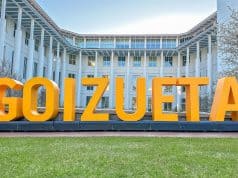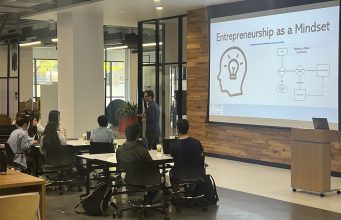In the spirit of collaboration and forward-thinking leadership, Emory University’s Goizueta Business School hosted the Southeast Regional Deans Conference on March 14, 2025. Envisioned and hosted by John H. Harland Dean and Professor of Information Systems & Operations Management Gareth James, the conference brought together over 30 deans from business schools across the Southeast to discuss the challenges and opportunities facing business education today.
Against a backdrop of rapid technological transformation, a changing economic landscape, and evolving student and employer expectations, Goizueta fostered a collective space for business school leaders to discuss how their schools are innovating and changing to best prepare students for a world that is writing new job titles and forging new industries.
“Universities have the capacity to change in real time, if we seize this critical moment to share expertise and think creatively to respond to these challenges,” shared James. “I enjoyed hearing the perspectives of my business school counterparts from across the Southeast and learning how we can work together to serve our students even better.”
Fireside Chat with Truist Chairman and CEO Bill Rogers
What will tomorrow’s business school look like? This question remained at the forefront of conversation as participants moved between a rigorous agenda featuring panel discussions, institutional showcases, and a headline fireside chat with Truist Chairman and Chief Executive Officer William H. “Bill” Rogers Jr.
As a native of North Carolina with degrees from UNC Chapel Hill and Georgia State, Rogers has strong Southern roots. He has a deep commitment to purpose and believes purpose is key to performance. His commitment to the community is demonstrated by his participation on several boards, including the Emory University Board of Trustees. The conversation with Dean James offered a window into the intersection of academic innovation and industry leadership.

“Hosting Bill Rogers was both a pleasure and an incredibly insightful opportunity for those of us in educational leadership. Bill was able to offer us practical wisdom regarding how the industry is shifting, and what kinds of hires he sees thriving,” shared James.
Rogers and James engaged in a candid conversation around future-forward topics such as artificial intelligence (AI) in the workplace, strategic leadership in times of change, and the evolving expectations companies have for graduates.
During the session, Rogers emphasized the importance of deeper industry–academic partnerships to ensure students are prepared for modern workforce demands. Rogers also noted that when paired with an MBA, a hybrid skillset that includes technical skills like logistics or engineering gives students a competitive edge. He challenged deans to “think backwards from the client”—in this case, students and employers—to design more relevant, agile curricula. The conversation also explored opportunities for faculty research collaborations, industry-funded initiatives, and co-developed programming aimed at bridging the skills gap.
Throughout the day, the deans exchanged ideas on topics ranging from student preparation and curricular innovation to how business schools can support a data-driven economy. Sessions on AI integration, cross-sector partnerships, and new program formats highlighted the deans’ shared commitment to reinvention.
Goizueta’s Part to Play
Goizueta’s own AI initiatives were spotlighted in a dedicated session, showcasing how the school is embedding emerging technologies into both pedagogy and practice—solidifying its role as a hub for applied innovation in management education.
Goizueta has also already begun refreshing its program curricula. Developed through a faculty-led design thinking process that incorporated feedback from current students, alumni, and corporate recruiters, the Bachelor of Business Administration (BBA) Program was recently redesigned to better prepare students for a data-driven world with complex business challenges. The MBA program is undergoing a similar treatment this year, with an emphasis on day-one career readiness. New developments are projected to include increased student agency in tailoring coursework, a quantitative data and AI bootcamp, Networking Fridays, a technology course that will update every year to capitalize on the moment’s biggest trends, and many other initiatives.
By convening this diverse and influential group of academic leaders, Goizueta demonstrated a timely vision: to lead not only in academic excellence, but in reimagining what business education can—and must—become in a rapidly evolving global landscape.
As Dean James noted in his closing remarks, “If we want to remain relevant, we have to stop solving yesterday’s challenges and start building tomorrow’s solutions—together.”











